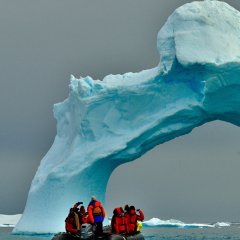World Ocean Radio - Polar Regions

This week on World Ocean Radio, host Peter Neill shares views and observations of the town of Isafjordur, Iceland, and the values it possesses as related to water, food, transportation, tourism, education, health, and cultural history--the qualities that give the area its unique identity.
This week on World Ocean Radio host Peter Neill shares observations from a recent trip to Greenland in collaboration with the Arctic Futures Institute. While visiting the four major coastal towns along the western coast, the melting glaciers that cover most of Greenland were dramatically visible. In this episode he discusses the several consequences of climate change and the rapid loss of sea ice.
World Ocean Radio host Peter Neill recently returned home from a trip to Antarctica aboard MS Island Sky with scientists from Woods Hole and a film crew from BBC-ONE, sharing insights and knowledge with other citizen scientists aboard. In this episode he offers reflections on his experiences in the last wilderness.
Antarctica, terra nullius--nobody's land, has long been a place apart, once explored only by intrepid and resourceful individuals willing to risk failure and death. Peter Neill, host of World Ocean Radio, will be in Antarctica next week aboard MS Island Sky with scientists from Woods Hole and a film crew from BBC-ONE, sharing insights and knowledge with other citizen scientists aboard, all wanting to experience and document the world's last wilderness. This upcoming trip has him thinking about the changing landscape and asking, "What are the real threats to the Antarctic?" and "Are changes to the planet hurtling us and these last wild places toward accelerated, irreversible change?"
On the heels of the Arctic Circle Conference in Reykjavik, Iceland in October, World Ocean Radio host Peter Neill offers some additional thoughts on a changing Arctic and China's role in the future of the polar north. In this episode of World Ocean Radio we detail the intentions of the Chinese as outlined in a policy statement published earlier this year. And we discuss the likelihood that eastern powers such as China will have increased vested interest in trade, governance and finance--a blue economic passage to the potential wealth of resources in a changing, melting north.

